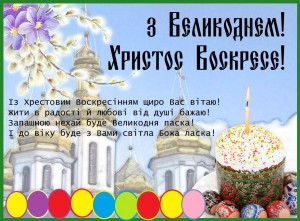The Paschal Epistle
of His Grace Iov, Bishop of Kashira,
Administrator of the Patriarchal Parishes in Canada
Dear Reverend Fathers, dear Brothers and Sisters in Christ!
I greet you from the depth of my heart with the Great and Sacred Holy Day of Pascha! Let the words of Pascal Greeting ring today everywhere and in all languages: “Христос Воскресе! Воистину Воскресе!” – “Christ is Risen! Truly He is Risen!” “Χριστός α̉νέστη! Αληθώς α̉νέστη!” – “Christus resurrexit! Vere resurrexit!”
“Pascha” is the word that any Christian treasures the most. While we pronounce it, the image of Resurrected Christ is depicted in our mind and we start to experience special spiritual joy. This word means “passage”, “pass over”, or “deliverance”; it also possesses the symbolical meaning and signifies a passage from the material to the spiritual, the process of spiritual rising of the soul from the earthly to the heavenly state. This idea is wonderfully expressed in the first irmos of the Pascal Canon: “Pascha, the Lord’s Pascha: from death to life and from earth to Heaven Christ God leads us…”
In Greek language the Hebrew word “pascha” coincides with the verb “pascho” – “to suffer”. This seemingly accidental concurrence is not fortuitous though, and deeply underlines the connection between “The Pascha of Suffering” and “The Pascha of Resurrection”, between the death of Christ and the moment of His Resurrection. Saint Apostle Paul expresses it directly: “Our Pascha, Christ, has been sacrificed for us” (1 Cor.5,7). The joy of the Resurrection came to us through the Cross of Christ: “For this joy came through the Cross to the whole world!” – as it is sung in the Pascal Hymn “Having seen the Resurrection of Christ.”
The meaning of “Pascha” of the New Testament is fully uncovered in another Pascal Chant “Having fallen asleep in the flesh”, which ends with the words: “The Pascha of incorruptness is the salvation of the world”. Pascha is our Salvation, the precious gift to us from Jesus Christ Himself. It is liberation of the faithful Christians from the enslavement of the devil and reception by them blessed immortality. Jesus Christ, as a yearling lamb, voluntarily gave himself as a sacrifice for all of us and suffered on the Cross in order to arise on the third day and give us the eternal life… We hear about it in the refrain of the ninth song of the Pascal Canon: “Christ – the New Pascha, an alive sacrifice, the Lamb of God, Who taketh away the sins of the world”.
But Christ’s Pascha becomes a salvation for us only if we participate in it. And how can we “participate” in Pascha? What does it mean? It means, first of all, to invite Christ into our hearts and, therefore, try to receive His Holy Blood and Flesh on every Divine Liturgy. The Pascal Lamb – is our Savior Jesus Christ Himself. And with boundless and unconditional love He gives Himself to us in the Mystery of Communion. We are reminded about this true bread of life – Jesus Christ – by the special leavened bread called in Greek “artos.” This bread is always being blessed after the Divine Liturgy on Pascha.
According to The Holy Scripture and the tradition of the Church, Jesus Christ, after His Resurrection, appeared to the Apostles during their repasts. That is why the head of their dining table was always left unoccupied and in the middle of it the bread was placed, which was intended for the Lord Himself. The tradition of placing beautifully formed artos on a special table before the altar when the Pascal Liturgy is being served, initiated at those apostolic feasts… During the Bright Week artos is usually being carried around the church with the Cross processions, and, after blessing, is being distributed to the praying people on the Eve of Saint Apostle Thomas Sunday. This custom, eventually, was transferred to the families, since in the Orthodox tradition we consider our homes to be small churches as well. The homemade artos became to be known as “kulich”, or an “Easter cake”, (in Greek it is called a ‘kollikon” – “a round bread”). Kulich is a tall bread of cylindrical form baked of rich dough and known as “paska” in Ukrainian language. At the Pascal table it represents the Resurrected Christ, His invisible presence among us. The form of a paska or a kulich reminds us of the Hill of Golgotha, on which the salvation of all faithful people from the total control of sin and death was obtained.
During the coming Pascal Divine Services let our souls, our hearts and all our lives be again filled with the bread of our salvation and of the eternal life- Jesus Christ Himself! Let our minds be enlightened with the everlasting light of the Christ’s Resurrection!
May Jesus Christ, Our Lord, grant us to celebrate Pascha according to the Apostle’s instruction: “not with old leaven, neither with the leaven of malice and wickedness; but with the unleavened bread of sincerity and truth!” (1 Cor. 5, 8) Let us during the Holy days of Pascha become the “new dough,” adorned through the Grace of God with many Christian virtues…
With Pascal assuring Good News of our Salvation, hierarchical blessing and wishes of bright joy, good health and God’s help in all your deeds in the name of Jesus Christ,
† Iov,
The Bishop of Kashira,
the Administrator of
the Patriarchal Parishes in Canada.
Edmonton, Pascha, 2013




 Save as PDF
Save as PDF